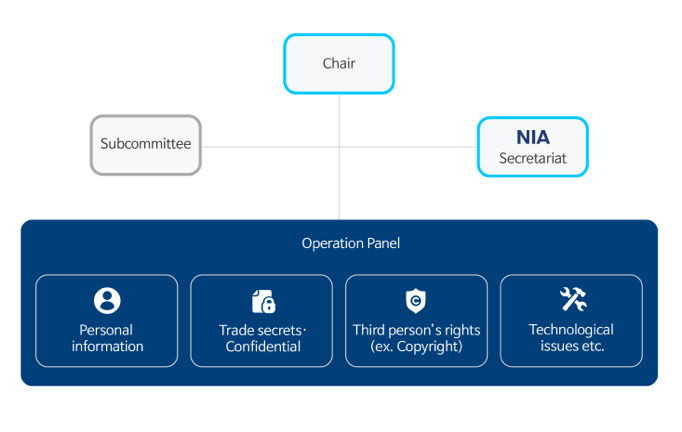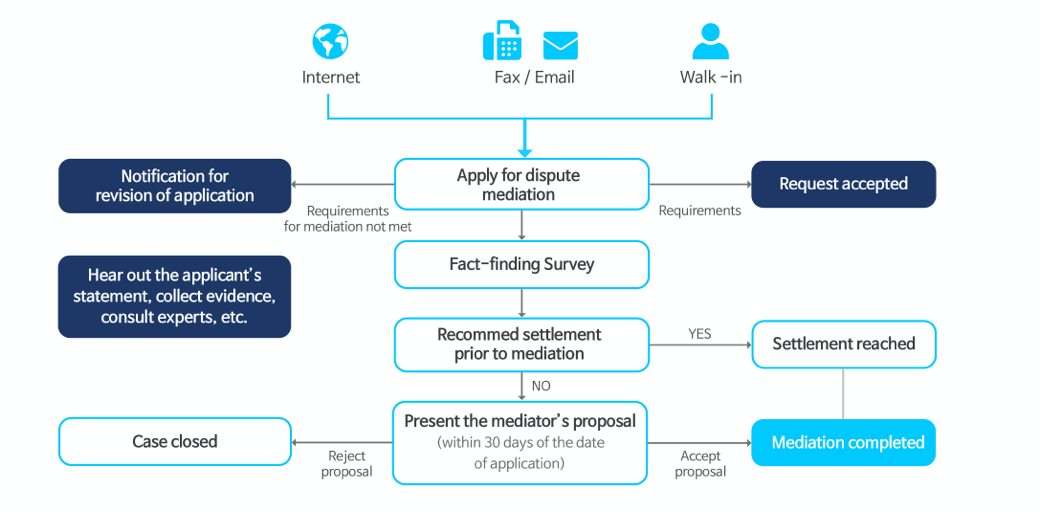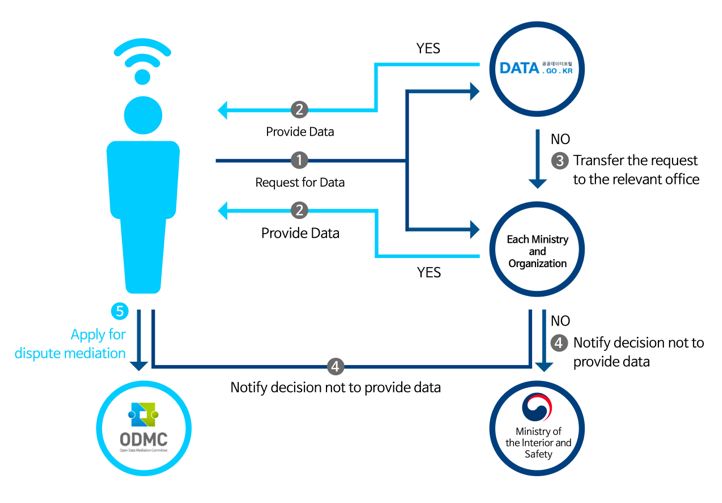Open Data Mediation Committee(ODMC)
Open Data Mediation Committee (ODMC) is an organization established in pursuant to Article 29 of Act onPromotion of the Provision and Use of Public Data to mediate conflicts arising from the denial or stoppage of public data by public organizations.
The Committee consists of one chairman, one permanent member as well as less than twenty-five members
including professors with a title higher than assistant professor, lawyers, civil society representatives, public organization representatives,
and other experts in various fields pertaining to the providing and usage of public data.
ORGANIZATION

ODMC may organize and operate a mediation panel comprised of five to seven mediators, if necessary to mediate disputes efficiently.
In such cases, any resolution passed by mediation panel with respect to any case entrusted by ODMC.
A secretariat is established to assist in the affairs of ODMC.
HISTORY
- Dec. 2013: Launched the 1st Committee(Chairman: Yoo, Haeyoung)
- Dec. 2015: Composed the 2nd Committee(Chairman: Yoo, Haeyoung)
- Dec. 2017: Composed the 3rd Committee(Chairman: Lee, Haewan)
- Dec. 2019: Composed the 4th Committee(Chairman: Lee, Haewan)
- Dec. 2021: Composed the 5th Committee(Chairman: Kim, Minho)
- Dec. 2024: Composed the 6th Committee(Chairman: Kim, Minho)
CONTACT
3F, 14, Cheonggyecheon-ro, Jung-gu, Seoul, Korea (04520)Mail odmc@nia.or.kr, Tel +82-2-6191-2064
OPEN DATA MEDIATION
There is increasing emphasis on opening and usage of public data.Accordingly, the system has been created to ensure that a user, who experiences problems from public organizations that refuse to provide or stop providing public data,
may seek effective remedies for his or her right to use such data without going to the trouble of complicated administrative litigation but through a simple procedure of dispute mediation.
Open Data Mediation Committee works with its experts from various areas to mediate between users and public organizations and thus solve problems through a procedure on dispute mediation.
APPLICANT
You can apply for dispute mediation at the homepage of the Open Data Mediation Committee, by fax, by phone, by email, or by simply visiting.
* An applicant can apply for mediation with the Open Data Mediation Committee within 60 days from the notification of non-provision of public data or termination of provision of public data.
MEDIATION PROCESS

Application
1. Receipt of a case and its notification
An applicant can apply for dispute mediation related to refusal or termination of provision of public data through our website, by mail, by fax, or by visiting personally or through an agent. One may apply during counseling on refusal or termination of provision of public data or while processing reporting cases. When a case is received for dispute mediation, its applicant and his or her counterpart are each notified thereof.
2. Fact checking and hearing parties involved.
A case officer checks facts related to the dispute to be mediated through data collection by using various means such as phone, mail, email, and fax, and when completed, creates a fact-checking report and therewith sends the case to the Committee
3. Recommendation of settlement prior to mediation
Prior to mediation, Open Data Mediation Committee can recommend settlement so that a dispute may be dissolved through voluntary efforts by parties involved, and if the parties reach an agreement on recommendation of settlement, the case is concluded.
4. Committee’s mediation proceedings begin
If settlement is not reached, mediation starts through the Committee. Once the mediation proceeds, the Committee implements necessary procedures such as hearing parties involved, collecting evidences, and consulting experts before it presents a reasonable mediator's proposal and recommends its acceptance, in which case the applicant and his or her counterpart can attend a session of the Committee to give their case. An applicant reserves the right to withdraw the application while the mediation procedure is under way, provided he or she does not want any more mediation for reasons of a fair settlement being reached.
5. Recommendation of settlement prior to mediation
Mediation is established if the applicant and his or her counterpart accept a decision on mediation made by Open Data Mediation Committee within 15 days from the date of decision. In case parties involved want to accept a mediator's proposal from the Committee, they shall sign and apply a seal on the mediation form delivered by the Committee and submit it to the Committee. Provided both parties accept the mediator's proposal, the mediation is established and drawn up, thus terminating the mediation procedure. In case either party fails to accept the mediator's proposal, he or she may can choose to file a legal action or give up on the case.
6. Effect of mediation
When mediation is completed with an applicant and his or her counterpart accepting mediation by Open Data Mediation Committee, Art. 32 Section 9 of Act on Promotion of the Provision and Use of Public Data assumes that a settlement (reconciliation through legal action) has been established between the parties, as specified in the mediator's proposal.
FAQ
Q. I have received public data in PDF from a public organization. Can I get it in a machine readable format such as csv, xml?A. Yes, you can. Provision of public data consists in providing to users public data in a usable format together with right to freely use it.
Q. Can public data provided by a public organization be processed and serviced by a developer according to his or her plan, demand, or intention?
A. Yes, it can be. A developer can use (or process) public data provided by a public organization for the purpose of commercial operation. The purpose of Act on Promotion of the Provision and Use of Public Data is to promote creation and distribution of new value added services that tap into public data.
Q. Government publications (those for offices and research reports etc.) eligible as public data to be opened up?
A. Those government publications that are electronically processed should qualify as public data to be opened. However, those government publications to which at least partial copyright has not been secured are to be excluded from public data to be opened.
